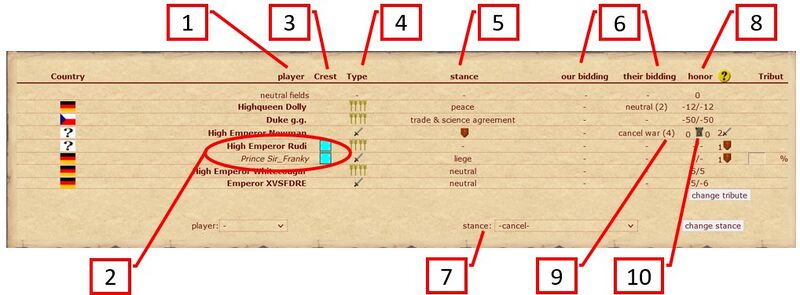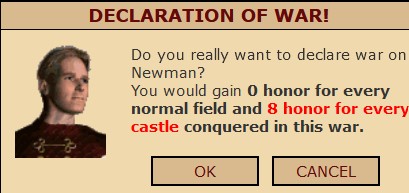Diplomacy and alliances
Version 5.0
How to contact other players
You automatically have diplomatic contact with all empires that are adjacent to at least one of your fields. In addition, diplomatic contact is established when a ship passes another player's coastal hex or when two players' ships meet. Once diplomatic contact has been established, it is maintained for the rest of the game. If you enter into an alliance with another player as a liege or vassal, you automatically receive their diplomatic contacts and vice versa.
Concluding contracts
Contracts are concluded between individual players (1) or alliances. An alliance is treated as a single player (2). In an alliance, only the feudal lord can conclude contracts (see alliances.
You can tell whether a player is in an alliance by the crest next to his name (3). You can also see whether the player is playing as a Settler or a Warrior (4). The diplomacy menu also shows the current diplomatic status (5) and the treaties on offer (6).
The basic diplomatic stance towards other players is neutral. In the 'Stance' menu, you can make a diplomatic proposal to a player (7), e.g. a non-aggression pact. However, such treaties only come into effect if the other party also wants to enter into the same treaty. Exceptions are declarations of war, which can also be made unilaterally, and the ending of a war by the aggressor. Of course, you do not need the consent of the other empire to dissolve treaties.
The following diplomatic relations are possible:
Peace
A peace treaty is a prerequisite for trade or research agreements. No espionage actions against the contract partner are possible. The termination of a peace by switching to "Neutral" lasts 96 ticks, unless both parties agree.
Non-aggression pact
Terminating a non-aggression pact by switching to "Neutral" takes 48 ticks. Espionage actions are possible.
Neutral
The initial state of diplomatic relations. Declarations of war take 12 ticks.
War
Opposing countries can only be attacked if you have previously declared war on the corresponding player. An attack is possible from the first war tick, i.e. the corresponding attack moves can already be entered in the tick before the war begins. It is not possible to declare war against players under noob-protection.
A declaration of war takes 12 ticks. You can only declare war on neutral opponents; if a peace treaty or NAP exists, it must first be terminated by declaring neutrality. Declarations of war cannot be withdrawn.
Temporary wars and honor
Wars are always limited in time and last 50 (raid), 200 (blitzkrieg), or 400 (campaign, warriors only) ticks. At the end of this time, the war ends automatically. Of course, you can start a new war against the same player at any time after a war has ended, but at the then current honor conditions (see below).
Wars against smaller players/alliances cost honor. In the "Honor" column (8) you can see how much honor the conquest of a field of this player would cost, depending on the type of declaration of war. In general, a war against a player who has at least 90% (campaign), 80% (blitzkrieg) or 70% (raid) of your own points is honorable, whereby the points of alliances are added together and existing wars of the defender are also taken into account (for more information, see Honour).
If a war is honorable, you can even gain honor if you conquer one of your opponent's castles. Before sending a declaration of war, a separate pop-up shows how much honor you would lose per field or castle. The declaration of war can still be canceled at this point.
As soon as the war has begun, you will see the remaining duration of the war in the diplomacy display (9) and how much honor you will gain or lose per conquered field or per conquered castle (castle icon) (10).
Counterattack
A special form of war is the counterattack. The defender in a war can announce a counterattack at any time. The duration of a counterattack is always 50% of the duration of the current war. For example, if a blitzkrieg (200 ticks) is being waged against a player, he can announce a counterattack lasting 100 ticks. As soon as the war has ended, it immediately switches to the counterattack. In simple terms, the counterattack extends the total duration of the war by 50%.
The advantage of the counterattack is that it can never cost honor, even if the player launching the counterattack is stronger than the original attacker.
Ending a war
Ending a war prematurely takes 50 ticks. By ending a war, diplomatic relations are set to neutral. Only the player who declared war first can end the war unilaterally. Even if the opponent has replied to the declaration of war, he cannot end the war of his own accord.
As soon as the opponent has announced a counterattack, the war can no longer be ended prematurely!
The "End war" action can no longer be canceled.
Trade agreement
A trade agreement between two realms gives both parties a bonus on the income of gold, ore, logs, stone, coal and grain. The smaller partner of a trade agreement has a higher profit compared to the larger partner. Players can have as many agreements as they want. However, trade agreements with players not belonging to the own alliance can create a maximum of 15 % bonus. In addition there is a 15 per cent bonus increase for every alliance member (irrespective to their size). That way one can reach a bonus maximum of 45 % having a full alliance and an honour level of 1000.
Research collaboration
Similar to the trade agreement, both partners of a research collaboration increase their output of research points. Here too, the maximum research bonus is 45 % (at an honour level of 1000): 15 % given by players not belonging to the own alliance and 15 % through each member of your alliance.
Becoming a vassal
A vassal serves his liege. Vassals automatically engage in a military collaboration, a trade agreement and a research collaboration with their liege and other vassals of that liege (15% bonus for each member). An alliance has a minimum duration of 200 turns. The secession of an vassal from an alliance takes 150 turns; This time can be reduced to 100 turns if both parties want to end the alliance. Therfore, the minimum total time before an alliance can be ended again is 300 turns. Afterwards, the diplomatic stance to all members of the former alliance is neutrality.
Becoming a liege
A liege can have up to two vassals in his alliance. As a liege you can also demand tribute from all goods your vassals produce. How much tribute you can demand depends on the difference in rank between you and your vassal. The higher the difference, the more tribute you can ask for.
Noob protection
To allow beginners and restarted some time for orientation and strengthening their realm, they are given "diplomatic protection" fo some time. These players are marked in green under "diplomacy", can not declare war and can not receive declarations of war. Furthermore they cannot become victims of espionage actions and cannot perform espionage actions. This protection ceases with a score of 60,000 at the beginning of the age. Every 50 turns this limit is increased by 6,000 points for newly starting players.
Holidays
A player in holidays cannot be attackt and no spy actions can be performed on his fields. When declaring a war, holidays will be taken into account when calculating honor losses: For example, if a member of an ally is on holidays, his points only count proportionally to the time he will be present during the war, during calculation of honor losses. In the Diplomacy menu players on holidays are showin in green with a small sun shade next to his name. More detaile about holidays can be found here.
Alliances
Alliance are formed by players accepting up to twoother players as vassals by diplomatic means, effectively becoming their liege. This requires some form of diplomatic contact, either by bordering lands or visiting ships.
When you are in an alliance you automatically adopt the diplomatic stance of your liege lord. Only the liege can sign treaties, when the liege goes to war, all vassals must follow.
Alliances have a minmum duration of 200 turns, before a petition for secession can be filed. A unilateral termination will take 150 turns whereas a mutually agreed termination only takes 100 turns. In total, termination of an alliance therfore takes at least 300 turns.
New vassals can only joint the ally at peace time, i.e. neither the liege, nor the new vassal must have ongoing wars or declarations of war.
Lieges can demand tribute from every one of their vassals who is of lower titel. The tribute can be at most double as high as the difference in titels. For example, a liege that is 2 titels higher than the vassals may ask for up to 4% tribute. The adjusted height of the tribute is not adapted automatically, if the order of rank between liege and vasall changes. Vassals have no way to reject the demand for tribute, except for seceding from the alliance. A good liege, however, is more interested in helping his vassals with word and deed than to burden them with tribute.
With foundation of an alliance an alliance depot is provided, which is located in the stock.
Besides the collaboration in trade and research, allies also have a military collaboration. This means:
- Armies can cross fields from allies similar to owned lands.
- Armies can defend the lands of allies and attack joined with allied forces. Joined espionage and ship combats at sea are similarly possible.
- Armies, ships, and spies can facilitate allied buildings (castles, harbours, thieves' guilds) for rest, repairs, embarking, and further training, respectively.
- However, armies can only be loaded on ships of the armies' owner.
If the alliance leader is defeated or deleted from the game due to inactivity, the alliance is not disbanded. Instead, the alliance member with the highest score becomes the new leader of the alliance. This does not change any ongoing diplomatic actions.
Players in alliances should be aware of the following:
- If players of an alliance attack together, the owner of the field from which the attack has taken place gets the field. If the attack from different fields took place, it is decided by chance.
- If a player conquers a field with his armies attacking from an allies' area, he will be the owner of the conquered field. This means that a player may have a realm containing islands of area withing another players realm.
- Allied armies are shattered when they are placed on a field owned by an ally and that ally is defeated. They return to the closest castle within a few rounds. This applies also to allies that are deleted due to inactivity or that leave the alliance. An army assisting in the defense of an allied castle fights until the last unit, and therefore the army, is destroyed. The owner of the ally receives the respective combat reports.
- The situation of allied ships in an harbor is similar. If a harbor is torn down or destroyed due to conquering or deletion of the player because of inactivity, the ships are placed on a water field next to the former harbor. However, if the harbor itself is conquered, then all ships are destroyed.
Special Rules
Arranging wars only to increase the honor penalty of potential opponents (self-serving wars) are prohibited. Therefore wars have to be actively conducted (this means conquering fields, spy actions, ship battles, etc.). Administrator will check wars regulatory and breaking this rule is punished with temporal bans. However, we hope that our players stick to this rule and the administrators don't have to interfere. Every player agrees to this rule by accepting our TOU.

